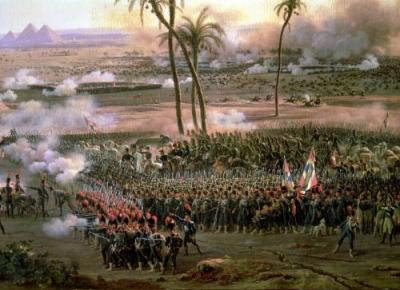

Copyright © 1998-2013 Historyguy.com and History Guy Media



Egyptian Revolution (1803-1805)-- Political violence engulfed Egypt, leading to the
rise of Muhammed Ali as Pasha of Egypt.
Anglo-Egyptian War (1807)-- Seeking to replace Muhammed Ali with a puppet ruler favorable
to British interests, Britain invaded with nearly 5,000 troops on March 17, 1807.
British forces led by General A. Mackenzie Fraser seized the city of Alexandria.
British forces suffered several military defeats before retreating and evacuating
Egypt on September 14.
Ali's Massacre of the Mamelukes (1811)-- In order to consolidate his power as the
ruler of Egypt, Muhammed Ali killed the Mameluke leaders and massacred the Mameluke
soldiers, replacing them with an army of Albanian mercenaries.
Wahabi War (1811-1818)-- After recognizing Ottoman suzerainty over Egypt (a formality
which left Ali in charge, but created a peace between Egypt and the Turks), Ali engaged
in a war against the Wahabi Muslim sect in Arabia. The Wahabis had conquered the
Muslim Holy cities of Mecca and Medina from Turkish rule, and in heavy fighting,
the Egyptians retook these Holy areas from the Wahabis and then occupied them in
the name of the Ottoman Empire.
Albanian Mercenary Mutiny (1815)-- Brief mutiny by Ali's Albanian mercenaries in
Cairo.
Egyptian Conquest of the Sudan (1820-1839)-- Led by Ali's son Hussein, Egyptian forces
conquered the Sudan, extending Egyptian control along the Red Sea coast, and as far
south along the Nile as modern Uganda, then known as Gondokoro.
Greek War of Independence (1821-1832)-- Egypt's part in the war came about when the
Ottoman Turks requested Egyptian aid in fighting the rebellious Greeks. The Pasha
of Egypt, Muhammad Ali, sent his son Ibrahim to Greece with a powerful Egyptian army.
The British, French, and Russians intervened to save the Greeks, defeating a combined
Turko-Egyptian fleet at the Battle of Navarino in 1827. French troops expelled the
Egyptian land forces. The Egyptian portion of the war lasted from 1825-1832. This
war led directly to the First Turko-Egyptian War. (see below) See also: Greco-Turkish
Wars
First Turko-Egyptian War (1832-1833)--Upset by the Ottoman Empire's refusal to give
him control of Syria as payment for his participation in the ill-fated Greek War,
Pasha Ali declared war on the Turks in 1832. Invading Ottoman Palestine, Syria, and
Turkey itself, the Egyptians advanced nearly to the Ottoman capital of Constantinople.
Russia sent troops and a fleet to stop the advance, causing the British and French
to negotiate a peace, awarding Syria to Egypt.
Second Turko-Egyptian War (1839-1841)--This conflict can be considered the second
half of the Turko-Egyptian War which began in 1832. Egypt declared independence from
official Ottoman rule, and defeated Turkish forces sent to subdue the Pasha's rebellion.
Eventually, Britain sided with the Ottomans to bring Egypt back into the Ottoman
fold.
Egyptian-Ethiopian War (1875-1877)--Ethiopia retaliated against Egyptian forces attempting
to colonize the Red Sea coast. Egypt gave up its attempt to colonize that area.
Urabi Revolt/British Conquest of Egypt (1881-1882)-- Muslim rebels opposed to Turkish,
Western, and Christian influence in Egypt (Britain and France had gained a large
degree of control due to the Suez Canal project), rebelled on February 1, 1881 in
Alexandria. On July 11, 1882, in response to a massacre of Christians in Alexandria,
the British fleet bombarded Alexandria, followed up by the landing of 25,000 troops
at Ismailia. In the Battle of Tel al-Kebir, the British defeated Urabi's army. From
this point on, Britain retained an army in the country and effectively controlled
Egypt, which remained technically an Ottoman (yet recognized as independent in all
but name), vassal.
Sudanese War (1881-1885)--The Sudanese "Mahdi", a religious leader, began a rebellion
against Egyptian control of the Sudan. At this time, Egypt was effectively a protectorate
of the British, who sent forces to aid the Egyptians. By 1885, after suffering several
bloody defeats, the Anglo-Egyptian forces withdrew from the Sudan.
Sudanese War (1896-1899)--Following their defeat in the previous Sudan War, Anglo-Egyptian
forces returned to the Sudan and defeated the forces of the Mahdi's successor, known
as the Khalifa.
The First World War (1914-1918)--Though not technically a participant in this war,
several battles betweent the British and the Ottoman Turks were fought on Egyptian
soil. Though legally a vassal of the Ottomans, in reality, Egypt was actually under
the control of the British, while also technically an independent nation with its
own ruler. That ruler was overthrown by the British at the beginning of the war due
to his pro-German sympathies.
Sanusi Revolt in Egypt (1915-1917)--The Sanusis were a Muslim sect (the Sanusiyah
Brotherhood; a Sufi mystical branch of Islam), and opposed European colonization
of North Africa. They fought both the French and the Italians before engaging in
combat with the British in Egypt during World War I as allies of the Ottoman Turks.
Most fighting took place in Egypt's western desert, with the British finally driving
the Sanusis into Italian-controlled Libya in 1917.
The Second World War (1940-1943)-While Egypt did not actually engage in combat in
this war, significant campaigns took place in western Egypt as the Germans and Italians
invaded with the intent of driving the British out and seizing the Suez Canal.
Arab-Israeli War of 1948 (1948-1949)--The First Arab-Israeli War, in which Egypt
acquired the Gaza Strip. See Arab-Israeli Wars
Anglo-Egyptian War of 1951-1952 (1951-1952)--Egyptian guerrillas, aided by the government
of Egypt, carried out a campaign against British forces stationed at the Suez Canal
and against other British and Western symbols and targets. On January 25, 1952, British
troops retaliated against Egypt by attacking an Egyptian police station, killing
50 and wounding 100. The conflict ended with a change in the Egyptian government
and the eventual withdrawal of British troops. This conflict led to Britain's involvement
in the 1956 Anglo-French-Israeli invasion of Egypt in 1956. (see below)
Israeli Raid on Gaza (Feb. 28, 1955)—Israeli forces conducted a raid, a response
to repeated guerrilla attacks and the seizure of an Israeli ship by Egypt, which
resulted in the deaths of 51 Egyptian soldiers and 8 Israeli troops. This raid was
the largest of its kind against Arab forces since the end of the First Arab-Israeli
War in 1949.--See Arab-Israeli Border Wars
Yemen Civil War (1962-1970)-- Egypt sent troops to support the Yemeni Republican
government against Royalist rebels supported by Saudi Arabia.
The Second Persian Gulf War (1990-1991)--Egypt sent troops to join the UN-backed
Coalition which liberated Kuwait from Iraqi occupation.
Muslim Brotherhood Rebellion (1990s- Present)--A rebel group calling itself the Muslim
Brotherhood carries on a violent guerrilla campaign to topple the pro-Western government
of Egypt.
Political Unrest in Egypt (2011)--Massive protests against the 30-year regime of
President Hosni Mubarak sweep across Egypt.
Egyptian Security Campaign in Sinai (2011-12)--In response to several attacks bySalafist
Islamist forces believed tied to al-Qaida, over 1,000 security forces backed by armored
personell carriers launched a campaign to defeat the Islamist guerrillas.
Egyptian Coup of 2013 (2013)--One year after the first freely-elected President of
Egypt, Muhammed Morsi, took office, he was removed from power in a July, 2013 military
coup. In the weeks prior to the coup, anti-Morsi demonstrations and protests filled
the streets of Egyptian cities. Following the coup, the Muslim Brotherhood, Morsi’s
political party, engaged in massive protests, which the military crushed violently,
causing over a thousand deaths.














